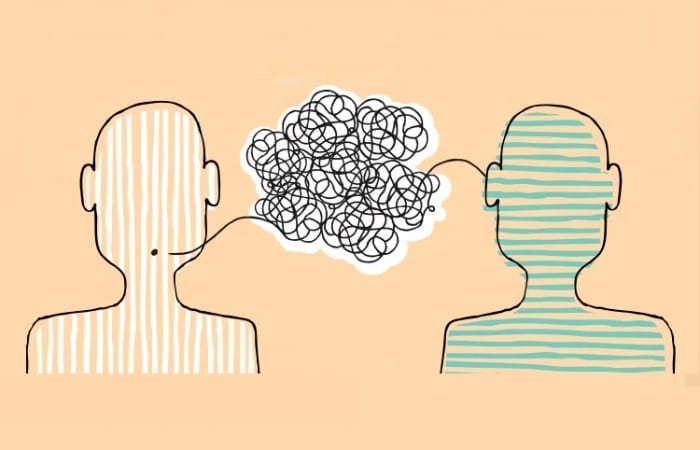
Blog
Misunderstanding

Misunderstanding as a common phenomenon in human communication can arise from cultural, linguistic, or experiential differences. These types of misinterpretations are often caused by lack of clarity in communication, incorrect interpretation of information, or individual assumptions. Misunderstandings not only lead to tension and conflict in interpersonal relationships but also have negative impacts on efficiency and teamwork in professional environments. Identifying and resolving misunderstandings is crucial and requires effective and clear communication between individuals.
فهرست عناوین
ToggleThe Impact of Misunderstanding on Human Relationships
Misunderstanding and misinterpretation of information are phenomena that can have deep and negative effects on human interactions. This article explores the psychological factors that influence misinterpretation and misunderstanding, analyzing their consequences on individual and social relationships. To better understand this, consider the following example:
In the learning process, close communication with teachers and mentors can have a profound impact on students’ understanding and mastery of various subjects. These interactions not only assist in the transfer of knowledge but also contribute to the development of critical skills and independent thinking. However, misunderstandings may arise in these relationships, leading to serious consequences for an individual’s learning path.
Misunderstandings in educational settings can result from unclear communication, cultural differences, or even incorrect expectations. These misunderstandings may lead to a student dropping out of school or not actively participating in classes. Research indicates that a lack of effective communication between teachers and students can lead to reduced motivation and academic performance.
Decisions made as a result of misunderstandings can have serious consequences for an individual’s professional future. For example, dropping out of school or switching majors due to a misunderstanding with a teacher may limit job opportunities and professional career paths. Studies show that effective communication in educational environments can contribute to greater job satisfaction and professional success in the future.
Furthermore, in the realm of human relationships, especially in marital relationships, misunderstandings can lead to serious tensions. These tensions not only affect the quality of marital life but can also have negative consequences for children. Research shows that ineffective communication and misunderstandings are among the main factors contributing to divorce and separation.

Five Factors Leading to Misunderstanding in Social Interactions
Misunderstandings in social interactions are a common and complex phenomenon that can arise from various factors. Psychologists emphasize five main factors, understanding and recognizing which can help reduce these misunderstandings:
- Distraction
- Emotional State
- Differences in Relationship Styles
- Self-Protectiveness
- Beliefs and Prejudices
This section examines the communication filters that can hinder healthy and effective communication. Five key factors have been identified, which need to be carefully considered. It is recommended to identify and eliminate these factors from your daily life to improve the quality of your interactions.
These factors can not only reduce the enjoyment and satisfaction of life but may also lead to issues such as depression and stagnation.
If you are on the path to marriage, learning these skills will not only help you but also allow you to teach them to your partner. This can lead to a sweet and tension-free married life.
Additionally, if you have children, providing a calm and healthy environment for their growth, with minimal psychological harm, will be possible. Therefore, being aware of these factors and striving to eliminate them can have a positive impact on the quality of your individual and social life.

Distraction and Its Impact on Social Misunderstandings
Distraction can be divided into two main categories: external distraction and internal distraction. External distraction stems from environmental factors that an individual has no control over, while internal distraction relates to the mental and emotional state of the individual.
External Factors: This type of distraction usually refers to external factors that capture an individual’s attention. For example, imagine you have parked your father’s car in a lot, and upon returning, you discover that the car has been towed by the police due to a violation. This event can cause anxiety and worry, distracting you from the conversation you’re having with a friend. In this case, the individual’s mental and emotional state causes distraction. These types of distractions can easily lead to misunderstandings. For example, during a conversation with your friend, you might respond superficially without paying attention to the details of what they are saying. If your friend later asks you to recall a promise you made during that conversation and you have no recollection of it, this situation could lead to misunderstanding and disappointment.
Another Factor Affecting Internal Distraction:
External factors can also impact your internal state. For example, when your mind is distracted by a loud sound coming from a speaker while your mother is talking to you, you might not be able to focus on what she’s saying, leading to ineffective and incorrect responses.
We recommend that to prevent misunderstandings, whether internal or external, you should try to control distracting factors. If controlling these factors is not possible, it’s better to move the conversation to a time and place where distractions are absent. For example, if you’re driving and your family is talking, you can lower the volume of the radio to avoid distractions and, as a result, prevent potential misunderstandings.
The Importance of Attention and Focus in Interpersonal Relationships:
In interpersonal relationships, attention to focus and accuracy is very important. If these factors are ignored, it is likely that the relationship will suffer. Particularly in marital relationships, one spouse may eagerly discuss emotional issues, but if you do not pay attention at that moment, you may forget everything they said, which can lead to misunderstandings.
Therefore, attention and focus on listening and speaking are fundamental aspects of any healthy relationship and should be given due consideration.
In couples therapy, one of the common challenges is the lack of mutual understanding of each other’s feelings and needs. This problem often arises from insufficient attention to one’s partner and their emotional state. In many cases, the other person might be so preoccupied with everyday matters that they are unable to hear or understand what you are saying. Therefore, the right time and setting to express feelings and opinions are extremely important.

Emotional State
Neglecting each other’s emotional needs can cause serious harm to relationships. If both partners are trained in communication skills, they can act more effectively when facing tensions and disagreements. For instance, when dealing with a financial crisis, such as not being able to pay the electricity bill, a simple apology and a diplomatic approach can help reduce tension and repair the relationship. This mature behavior can lead to changes in the other partner’s reactions and reduce childish and irrational behaviors.
To avoid misunderstandings and maintain the health of the relationship, it is essential for each individual to effectively communicate their feelings and emotional state. Psychologists believe that one of the biggest problems in relationships is the role of the “ineffective communicator.” This role involves miscommunicating information and feelings, which can lead to confusion and emotional distance.
Instead of this approach, it’s better for the person to take on the role of a “skilled communicator.” This means that before suspicion filters or incorrect judgments hinder communication, the person should clearly express their feelings and issues. For example, one could say: “I am currently under pressure, and this is affecting my behavior.” Such expressions of emotion can help prevent misunderstandings and create a safer space for dialogue.
Ultimately, no one can magically know another person’s emotional state. Therefore, establishing honest and transparent communication between partners is essential to prevent serious problems from arising.
Suggested article: Family psychology
Behavioral Style
An individual’s behavioral style in verbal communication significantly impacts the quality of social interactions. Some people may face phenotypic challenges that affect their ability to articulate words clearly and effectively. In situations where words are not expressed clearly or sentences are incoherent, the pace of the conversation may also become abnormal. These conditions can lead to misunderstandings from the other party, disrupting communication.
People who make verbal mistakes in their speech may unintentionally convey incorrect messages to the listener, which may conflict with their original intention, potentially leading to misunderstandings.
Additionally, some individuals may have an aggressive speaking style. For example, someone may want to offer you food with good intentions, but their tone may come across as aggressive. This type of expression does not necessarily imply an intent to attack or harm the other person, but rather could stem from a lack of awareness about the impact of their tone and communication style

Self-Support: A Pillar of Psychological Peace and Security
Self-support is considered one of the fundamental elements of human psychological peace and security. For instance, a person might purchase a bag for themselves after a long period and hide it. This action is done as a form of self-support to provide the individual with a sense of greater security. In this process, the person might withhold certain issues from their partner, potentially leading to misunderstandings.
The individual’s intention in such circumstances is usually neither to lie nor to create conflict but rather to preserve their own security and peace. However, failing to express feelings and needs honestly can lead to problems in interpersonal relationships.
An effective solution to prevent such misunderstandings is to practice honesty in communication. Even if a person fears the reaction of the other party, they should strive to express their feelings and concerns openly. For example, one might say, “I am afraid you might get angry, but I want to bring this up to prevent future misunderstandings.”
This type of honest communication can strengthen relationships, foster mutual understanding, and create a greater sense of security in social interactions.
Suggested article: Relationship mistakes
The Importance of Mindset
An individual’s mindset directly influences their decision-making and behavior. When you perceive someone as a scientist, for example, that perception may impact how you interact with them. You may adjust your behavior in their presence out of respect and admiration for their status.
It is recommended to avoid subjective judgments and prejudices, as they can have negative consequences. For example, if I ask you how much money you have, you might react harshly and negatively due to concerns about my intentions, even though my purpose might simply be to assess your financial situation to determine costs. In this case, you have transformed my positive intention into a negative one, which could harm relationships.
The best approach is to clarify the concepts for yourself. This means trying to clearly understand your interpretations of people and situations. The human brain is always processing information and making judgments about others, even when at rest. Therefore, when you hold a specific belief, you tend to seek out evidence that supports that belief.
Ultimately, awareness of your own mindsets can improve relationships and reduce misunderstandings.
برای مشاوره رایگان و رزرو وقت (یا اگر تماس گرفتید و قادر به پاسخگویی نبودیم) شماره تماس خود را وارد کنید. ما به زودی با شما تماس می گیریم!



